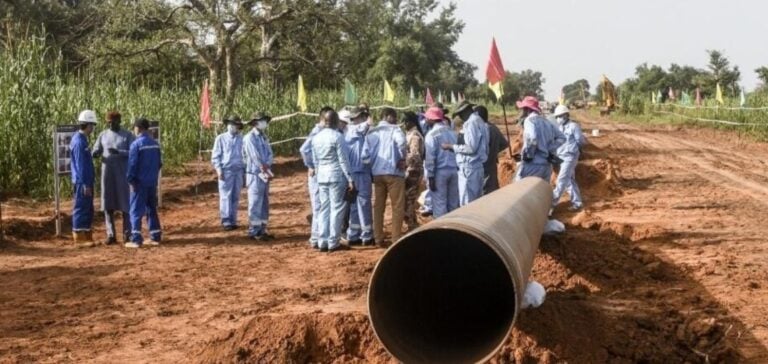Niger recently made a strategic decision to halt its oil exports to China, which were routed via a pipeline through Benin. This decision, announced by Niger’s Oil Minister, Mahamane Moustapha Barke Bako, marks a new escalation in tensions between the two neighboring countries. Niger‘s oil exports, which were to transit through the Beninese port to China, were governed by a memorandum of understanding with China National Petroleum Corp (CNPC), worth $400 million. However, these flows were brought to an abrupt halt when the Minister ordered the closure of a section of the 2,000 km pipeline linking the Agadem oilfields to the Benin coast.
Origins of tension
Relations between Niger and Benin have deteriorated since Benin blocked crude oil exports from Niger via its port in May, demanding the reopening of the Niger border for its goods and the normalization of bilateral relations. This measure was perceived by Niamey as excessive pressure, especially in the context of regional instability. In June, the situation further escalated when five Nigerian nationals were arrested by Beninese authorities at the Seme-Kpodji terminale. Accused of fraudulent entry, they were actually present to supervise the loading of oil, in accordance with an agreement between the two countries, according to Niger.
Reactions and consequences
Speaking on national television, Minister Bako justified the suspension of exports by saying: “We can’t stand by while our oil is stolen by others, because we’re not present when it’s loaded”. This statement highlights Niger’s frustration and determination to protect its resources. Current tensions stem from the July 2023 coup d’état in Niger, which led to the imposition of strict sanctions by the Economic Community of West African States (ECOWAS) for over six months. Although these sanctions have recently been lifted, Niger has kept its borders closed to Beninese goods, hampering regional trade.
Impact on the oil market
The suspension of Niger’s oil exports to China via Benin could have major repercussions on the regional oil market. The pipeline, built to facilitate oil exports, represents a crucial investment for Niger, a landlocked country dependent on its natural resources to boost its economy. This situation also complicates trade relations between Niger and Benin, two economically interdependent countries. The persistence of these tensions could lead to long-term disruption in the region’s energy sector, affecting not only exports but also future investments. Niger’s decision to suspend its oil exports is a powerful move aimed at putting pressure on Benin to resolve its ongoing disputes. However, without swift diplomatic intervention, relations between the two countries are likely to deteriorate further, with potentially serious consequences for the region’s stability and economic development.






















